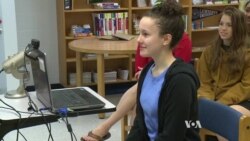As classes were getting underway at a high school in Alexandria, Virginia, a group of students gathered around a laptop computer and peered into a classroom half a world away in Jakarta, Indonesia.
After a bit of hesitation, one girl got up and sat in front of the microphone.
“Hello, I’m Margaret. I go to West Potomac High School,” she said.
It was just after 8 a.m. in Virginia — and 7 p.m. in Jakarta — and Margaret Gorguissian started the antipodal videochat by talking about the vibe among her fellow students.
“People in our school work really hard to kind of, uh, accept one another,” she said.
After she finished, Raynard Rabiul Tsani took the microphone at the SMA Islam Al Azhar 1 High School in the Indonesian capital, and did the same.
“There is this unifying bond,” he said. “Something that unites us that makes us together, whether it’s the same religion, or the same races, or the same law.”
Differences in religion, culture and other areas often add fuel to political conflicts around the world. But the Tony Blair Faith Foundation, named after the former British prime minister, is helping high schools in a number of countries use videoconferencing to bridge those divides.
The program is called Face to Faith. It’s active in more than 20 countries, including many in conflict areas, and has connected upward of 120,000 students aged 12 to 17. In addition to the videochatting, they learn dialogue skills to be able to deal with sensitive topics in a safe and respectful way.
Kristen Looney, the foundation’s head of programs and partnerships, said Face to Faith’s aim is to have a generation of youngsters at ease with religious and cultural differences.
“We are trying to create a safe place where students can come as they authentically are and to talk about what motivates them,” she said.
With the help of a moderator, who connects from yet another part of the world, the students also broach awkward topics.
A Muslim-American girl at West Potomac talked about how she feels judged if she wears a hijab.
An Indonesian student conceded that the harmony at his school existed against a backdrop of a history of violence in the country.
The students of the Virginia school have been having conversations like these just about every month during the past year. And even though it is called Face to Faith, the conversations cover a wide range of related topics.
“Even though we didn’t speak directly about religion, I feel like we both recognized that there were religious differences between us, and we respected those differences,” Gorguissian said afterward.
“In the end we are humans who have the same point of view, and that is that we have mutual respect for each other,” said Indonesian student Rahma Marsha.
Adam Greenbaum in Virginia and Ahadian Utama in Jakarta contributed to this report.





